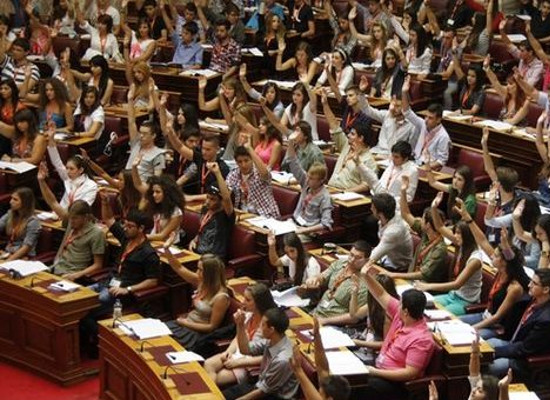
11-07-16 Education minister answers student MPs’ question
New type of special education schools planned
Education Minister Nikos Filis addressed youths at a model student parliament held at the Greek parliament today, where he announced plans for a Special Education Professional Gymnasium-Lyceum, operating under a single principal, with four years of gymnasium (junior high school) and four years of lyceum (senior high school). Graduates will have the same professional rights as graduates of the EPAL vocational lyceums.
Filis conceded that special education has in the past been neglected by the state. Stressing the need to bolster the dignity and self-esteem of all students of special schools, the minister said that after an eight year hiatus, 400 new special education divisions are being created at schools so that students with special needs may receive differentiated instruction in the same school as all other children, to avoid a sense of ghetto in primary schools.
The measures include creation of new Special Workshops of Vocational Training (EEEEK) with an an internal restructuring so as to meet the educational needs of youngsters, expanding the course offering to include students from special education vocational schools, creation of school cooperatives at Special Schools, and the operation of special education Schools and Institutes of Vocational schools.
Associations of parents who bear the additional burden of educating children with special needs will be assisted in creating cooperative enterprises with terms of protected labour for students who graduate from special education technical-vocational schools.
Changes in the hourly programmes of gymnasiums (junior high)
Asked about the three-hour weekly reduction in class time (down from 35 to 32 hours), Filis said the decision was taken by the Institute of Educational Policy following research and study, and not by the minister.
Filis insisted that what is needed in junior high school is fewer exams and more classroom teaching time. “We don’t want to give students the impression that they are participating simply in order to take exams. We want a longer school year, divided into trimesters and not three-month teaching periods. At the end of each junior high school grade the final exams should not test in 12 or 15 subjects, but instead students should be examined only in subjects most essential to the operation of the school. We want substance and not formality, especially in junior high schools, with an emphasis on the teacher-student relationship and not exams,” Filis said.
“We want quality time in schools, where teachers serve the educational programme, rather than the school serving teachers’ labour rights first. The school is there to serve educational needs first,” Filis said.
On instruction in ancient Greek, Filis said the course should be either taught from the original text in high school or in translation in junior high school. “We want to stress literature and the living language of the people with which we communicate today, into which Greeklish has unfortunately seeped in,” he noted.
Filis also stressed the need for new courses such as sexual education and instruction regarding addictions. “Sexualeducationcannotbeabsentfromschools. Thatiscriminal. You cannot exclude discussion of addictions, from narcotics to tablets, from schools,” he underlined.
The question of religious instruction and school national parades
“We do not want religious instruction to be catechism. Why? Because that means that the teacher or theologian is there to make someone Christian. Can that be graded? Can we grade whether someone is a good or bad Christian,” Filis asked, noting that this is “irrational” and that the government wants non-denominational schools. He conceded that issues regarding Eastern Orthodox religion should be treated at greater length since the majority adhere to this religion.
The issue of school parades
Nikos Filis underlined that student parades were first established during the dictatorship of Ioannis Metaxas in 1937, in order to inculcate national beliefs in Greek students. “From the start these parades did not constitute an element in the national identity of the child and of the modern Greek,” he opined. “The meaning of national anniversaries should be taught at schools and in municipalities with celebrations that teach us about our culture and history,” he added
School prayer
Filis said that the ministry has decided that school prayer cannot be obligatory, and that it is not for teachers’ associations to decide, as that could cause divisions. However, he said that if some students want to hold morning prayers that will not be forbidden. ‘We do not consider that the Greek identity and the Orthodox Christian identity are identical. We want to have freedom. I stress that the basis of our ethnic identity is democracy,’ he asserted.
Arts courses
Minister Filis said that arts education expands the horizons of students, just as political education expands the horizons of adults. “If the state aims at the democratic education of students, both adolescents and younger, artistic courses in the broader sense of literature, visual arts and music must be part of the backbone of education,” Filis said, adding that he hopes to expand such courses.
Changes in university entrance exams
Nikos Filis said that he hopes to reform the lyceum exams system, and especially the last year of high school, which is almost exclusively exam oriented. He said this requires public dialogue with all political parties, to make schools that offer quality and equality and not a place of cut-throat competition, not a university admissions tutorial. The reform process will take at least three years he said.
Private tutoring
Filis said that reducing the exam load will help restrict costly private tutoring demand. He also said that the mentality that those who do not attend university are second class citizens must be transcended.
“There are many ways after high school to go forward in life. Vocational and technical education is downgraded in our country. We want to emphasise this so students can after a comprehensive education be led to the right choices for them, including higher and tertiary technical training,” Filis said.
